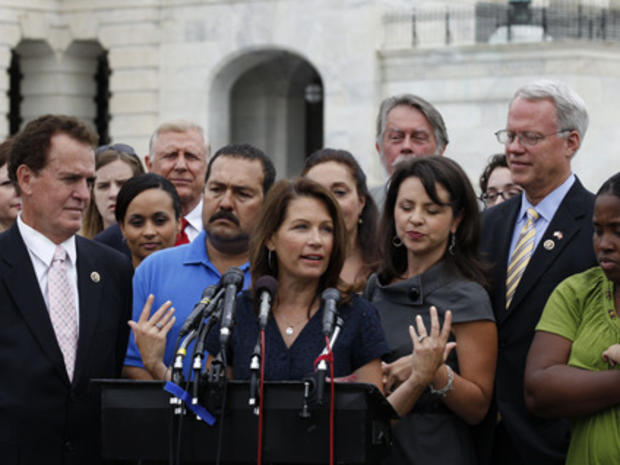Tea Partiers Requested More than $1 Billion in Earmarks
Influenced largely by the Tea Party, Republicans in Congress this year have taken a firm stance against earmarks to show their commitment to cutting back government spending.
It turns out, however, that members of the House Tea Party Caucus requested more than $1 billion in earmarks in the 2010 fiscal year, the National Journal reports.
After reviewing data compiled by Citizens Against Government Waste, the National Journal found that several of the 52 Tea Party caucus members made requests for earmarks -- federal funds that go to specific districts for specific companies or projects. In all, Tea Party caucus members requested a total of 764 earmarks valued at $1,049,783,150.
The founder of the Tea Party caucus, Rep. Michele Bachmann (R-Minn.), refrained from making any earmark requests, as did 13 of her colleagues.
Yet as many as 29 caucus members made requests for more than $10 million in earmarks, and seven more asked for more than $50 million in special funding.
Rep. Denny Rehberg (R-Mont.) signed onto 88 earmark requests at a cost of $100,514,200 -- more than any other Tea Party caucus member, the National Journal found. Most of the requests Rehberg signed onto were made jointly with Montana's Democratic Sens. Max Baucus and Jon Tester. Rep. Robert Aderholt (R-Ala.) signed onto 69 earmark requests this year worth $78,263,000, while Rep. Todd Tiahrt (R-Kan.) asked for $63,400,000 in funding for 39 projects.
When she founded the Tea Party caucus, Bachmann said in a statement that the American people "have had enough of the spending, the bureaucracy, and the government knows best mentality running rampant today throughout the halls of Congress."
Rep. Rodney Alexander (R-La.) requested 41 earmarks worth $65,395,000, but his office told the National Journal that he supports the earmark ban and has not submitted any earmark requests since joining the Tea Party caucus in July. Furthermore, Alexander reportedly withdrew his outstanding requests that were included in the Water Resources Development Act.
Taking up the call for less government spending, House Republicans in March voluntarily adopted a one-year moratorium on earmarks, and Senate Republicans followed their lead (even though the move is largely symbolic). Additionally, Republicans have already adopted a voluntary earmark ban for the next Congress.
Stephanie Condon is a political reporter for CBSNews.com. You can read more of her posts here. Follow Hotsheet on Facebook and Twitter.

